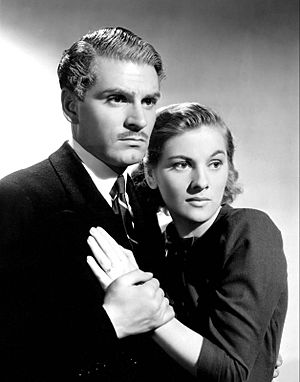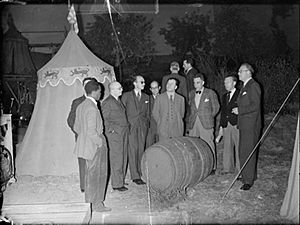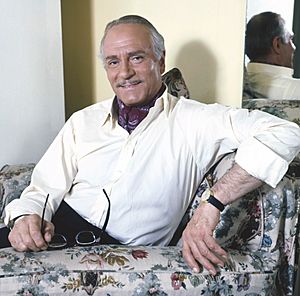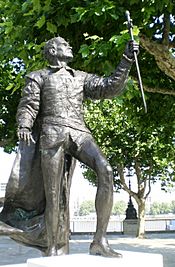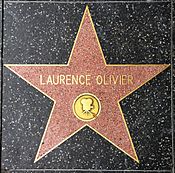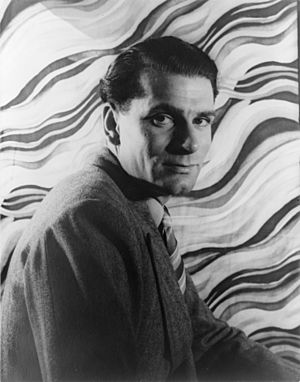Laurence Olivier facts for kids
Quick facts for kids
The Lord Olivier
|
|
|---|---|
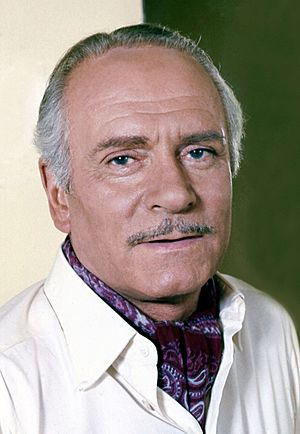
Olivier in 1972
|
|
| Born |
Laurence Kerr Olivier
22 May 1907 Dorking, Surrey, England
|
| Died | 11 July 1989 (aged 82) Steyning, West Sussex, England
|
| Occupation |
|
| Years active | 1925–1988 |
|
Works
|
Full list |
| Spouse(s) |
|
| Children | 4 |
| Awards | Full list |
Laurence Olivier (born Laurence Kerr Olivier, 22 May 1907 – 11 July 1989) was a famous English actor and director. He was one of the most important actors of the mid-20th century. He worked a lot in theatre, films, and television.
Olivier's father, a clergyman, wanted him to become an actor. After drama school, Olivier started acting in the late 1920s. In 1930, he became well-known in a play called Private Lives. He also appeared in his first film that year. By the end of the 1930s, he was a big star.
In the 1940s, Olivier helped lead a theatre company called the Old Vic. He made it a very respected group. Some of his most famous roles there were Richard III and Oedipus. Later, he became the first director of Britain's National Theatre from 1963 to 1973. He helped many young actors become stars. At the National Theatre, he played Othello and Shylock in The Merchant of Venice.
Olivier also starred in many famous films. These include Wuthering Heights (1939) and Rebecca (1940). He also directed and starred in three Shakespeare films: Henry V (1944), Hamlet (1948), and Richard III (1955). Later films included Spartacus (1960) and Marathon Man (1976). He also had success in television shows.
Olivier received many awards for his work. He was knighted in 1947, becoming "Sir Laurence Olivier". In 1970, he became a "life peer", which means he could sit in the House of Lords. He also won four Academy Awards (Oscars). The main theatre at the National Theatre is named after him. The Laurence Olivier Awards are also named in his honour. He was married three times, to actresses Jill Esmond, Vivien Leigh, and Joan Plowright.
Contents
- Early Life and Acting Start (1907–1929)
- Becoming a Star (1930–1938)
- Hollywood and War Efforts (1938–1944)
- Leading the Old Vic (1944–1948)
- Post-War Career and Challenges (1948–1956)
- New Directions and the National Theatre (1957–1974)
- Later Years and Legacy (1975–1989)
- Honours and Awards
- Acting Style and Impact
- See also
Early Life and Acting Start (1907–1929)
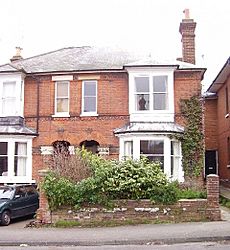
Laurence Olivier was born in Dorking, England, in 1907. He was the youngest of three children. His father, Gerard Kerr Olivier, was a Church of England priest. The family moved around a lot when Laurence was very young.
In 1912, his father got a steady job in London. This brought more stability to their family life. Laurence was very close to his mother. He found his father a bit distant, but learned a lot about performing from him. His father had thought about being an actor himself. He was a very dramatic preacher. Olivier remembered how his father changed his voice and mood. This taught him a lot about acting.
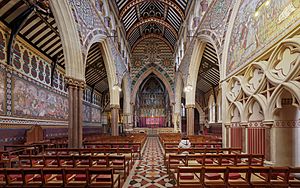
In 1916, Olivier joined the choir school of All Saints, Margaret Street. The church services were very theatrical. This appealed to young Laurence. The school encouraged students to enjoy plays. In 1917, at age ten, Olivier played Brutus in a school play of Julius Caesar. Famous actress Ellen Terry saw him. She wrote that he was "already a great actor." He also played female roles in other school plays.
From 1921 to 1924, Olivier went to St Edward's School, Oxford. He didn't stand out much until his last year. He played Puck in A Midsummer Night's Dream. His performance was amazing and made him popular. In 1924, his father told him he would go "on the stage."
Learning to Act (1924–1929)
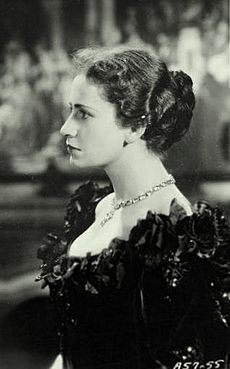
In 1924, Olivier got a scholarship to the Central School of Speech Training and Dramatic Art in London. He wasn't the most serious student. But the school's founder, Elsie Fogerty, liked him. She said he and his classmate Peggy Ashcroft were special.
After school, Olivier worked with small theatre groups. His first stage appearance was in Brighton in 1925. He tripped and fell when he came on stage! Later that year, he joined a London company. He learned from famous actors like Sybil Thorndike. He tried to act naturally and avoid over-the-top styles.
In 1926, Olivier joined the Birmingham Repertory Company. This was like his "university" for acting. He played many different roles there. He also became lifelong friends with fellow actor Ralph Richardson. This friendship was very important for British theatre.
In 1928, Olivier played Stanhope in Journey's End. This play was a big success. He was offered the role in London's West End. But he chose a more exciting role in Beau Geste. Journey's End became a hit, but Beau Geste failed. Still, critics saw his talent. One newspaper said, "Mr. Laurence Olivier is going to make a big name for himself."
Becoming a Star (1930–1938)
In 1930, Olivier took small film roles to earn extra money. He didn't love film acting at first. He thought it was "anaemic." But it paid much better than theatre. He also met Laurence Evans, who became his manager.
Olivier married actress Jill Esmond in July 1930. Soon after, he was cast in Noël Coward's play Private Lives. He played Victor Prynne. This was his first big success in the West End and then on Broadway. Coward became a mentor to him.
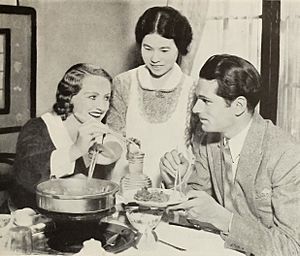
In 1931, Olivier went to Hollywood for a film contract. He made a few films, but they weren't huge hits. He didn't feel Hollywood was right for him yet. He returned to London and made more British films. In 1933, he almost starred with Greta Garbo in Queen Christina. But he was replaced because they didn't have good chemistry.
In 1935, John Gielgud directed Romeo and Juliet in London. Olivier played Romeo, and Gielgud played Mercutio. They later swapped roles. The play was very popular. Critics praised Olivier's strong performance. But they said Gielgud was better at speaking Shakespeare's poetry. This caused some tension between the two actors.
Joining the Old Vic and Meeting Vivien Leigh (1936–1938)
In 1936, Olivier joined the Old Vic theatre company. This theatre was known for Shakespeare plays. Many great actors had worked there. Olivier joined actors like Edith Evans and Alec Guinness. In 1937, he played Hamlet. Critics again compared his performance to Gielgud's. They praised Olivier's energy but noted Gielgud's emotional depth.
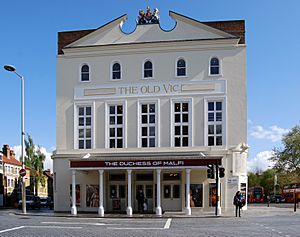
After Hamlet, Olivier played Sir Toby Belch in Twelfth Night. He also played Henry V. This play was a big success. In 1936, Olivier also made his first Shakespeare film, As You Like It.
The next year, Olivier starred with Vivien Leigh in Fire Over England. He had met Leigh earlier. They began a relationship. In June 1937, the Old Vic company performed Hamlet at Elsinore Castle in Denmark. Olivier arranged for Leigh to play Ophelia.
In 1938, Olivier returned to the Old Vic. He played Iago in Othello, with Ralph Richardson as Othello. Later, he starred in Coriolanus. Critics loved his performance. They said it was his first truly great role. This was his last London stage appearance for six years.
Hollywood and War Efforts (1938–1944)
In 1938, Olivier went to Hollywood. He earned a lot of money to play Heathcliff in the 1939 film Wuthering Heights. Vivien Leigh soon joined him. She hoped to get the role of Scarlett O'Hara in Gone with the Wind, which she did. Olivier didn't enjoy making Wuthering Heights at first. But the director, William Wyler, taught him how to act better for films. The movie was a big success. It made him a film star.
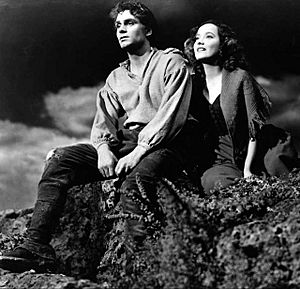
After Wuthering Heights, Olivier starred in Alfred Hitchcock's Rebecca (1940). He also played Mr. Darcy in Pride and Prejudice (1940). He received good reviews for both films. In January 1940, Olivier and Jill Esmond divorced. Olivier and Vivien Leigh married in August 1940.
The Second World War had begun in Europe. Olivier wanted to help. He joined the Fleet Air Arm (part of the Royal Navy). He also made propaganda films. These films helped boost morale in Britain. One film was 49th Parallel. Another was The Demi-Paradise.
In 1943, Olivier started working on Henry V. He directed, produced, and starred in the film. The film was released in November 1944. It reminded people what Britain was fighting for. The film was praised by critics. Olivier was nominated for an Oscar for Best Actor. He also received a special award.
Leading the Old Vic (1944–1948)
During the war, Tyrone Guthrie kept the Old Vic theatre company going. In 1944, he asked Ralph Richardson to lead it. Richardson agreed, but only if Olivier and John Burrell joined him. The Royal Navy allowed Olivier and Richardson to leave their service.
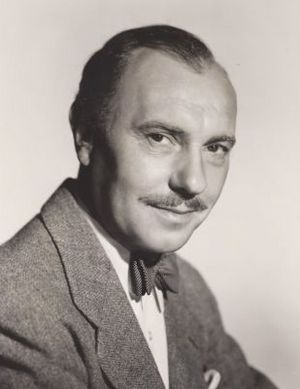
The three men led the Old Vic company. They performed at the New Theatre in London. Their first season was a big success. Olivier played roles like Richard III. His performance as Richard III was so good that it became his most copied role. In 1945, the company toured Germany and Paris. Critics said Richardson and Olivier made the Old Vic the most famous theatre in the English-speaking world.
In their second season, Olivier played Hotspur in Henry IV, Part 1 and Justice Shallow in Henry IV, Part 2. He also starred in Oedipus Rex and The Critic. He switched from serious tragedy to funny comedy in these two plays. This impressed many people. The company also performed on Broadway.
In 1946–47, Olivier played King Lear. Richardson was knighted during this time. Olivier was also knighted six months later. In January 1947, Olivier started directing his second film, Hamlet. He also played the main role. The film was a big success in Britain and other countries. Hamlet was the first non-American film to win the Academy Award for Best Picture. Olivier won the Oscar for Best Actor.
In 1948, Olivier led the Old Vic company on a tour of Australia and New Zealand. He performed in Richard III and other plays. While he was away, the Old Vic leaders ended the contracts of Olivier, Richardson, and Burrell. Many people felt this was a mistake. The Old Vic years under them are seen as the theatre's greatest.
Post-War Career and Challenges (1948–1956)
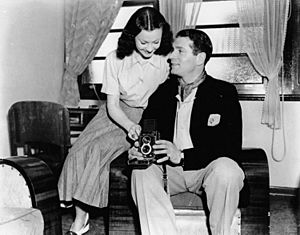
In 1949, Olivier helped stage the first English production of Tennessee Williams's play A Streetcar Named Desire. His wife, Vivien Leigh, played the main role of Blanche DuBois. The play was very popular. Leigh later played Blanche in the 1951 film version.
Olivier also ran his own production company. He produced and starred in plays like Venus Observed and Caesar and Cleopatra. He and Leigh performed these plays in London and on Broadway.
Independent Acting and Health (1951–1956)
In 1951, Olivier joined Leigh in Hollywood to film Carrie. During this time, Olivier noticed changes in Leigh's behaviour. She faced serious health challenges that affected her well-being. This was a difficult time for Olivier.
For the Coronation in 1953, Olivier and Leigh starred in The Sleeping Prince. It was a light comedy.
In 1954, Olivier directed his third Shakespeare film, Richard III. He also co-produced it. The film featured four famous actors who had been knighted. Critics liked the film, but it didn't make a lot of money. Olivier won a BAFTA award for his role.
In 1955, Olivier and Leigh performed in three plays at the Royal Shakespeare Theatre in Stratford. Olivier played Malvolio in Twelfth Night and Macbeth in Macbeth. His Macbeth was considered the best of his time. Leigh played Lady Macbeth. Their third play was Titus Andronicus. Olivier's performance as Titus was highly praised. It was a landmark in British theatre.
In 1956, Olivier directed and co-starred with Marilyn Monroe in the film The Prince and the Showgirl. Filming was challenging due to Monroe's behaviour. But the film was well-received.
New Directions and the National Theatre (1957–1974)
In 1957, Olivier saw John Osborne's play Look Back in Anger. He later asked to star in Osborne's new play, The Entertainer. He played Archie Rice, a sad comedian. Olivier said this role made him feel like a "modern actor again." He showed that he could act in new, challenging plays.
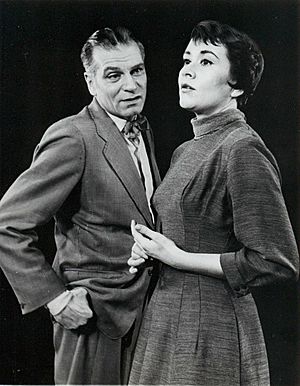
During this time, Olivier began a relationship with actress Joan Plowright. Their marriage ended in 1960. He married Plowright in March 1961. They had three children: Richard, Tamsin, and Julie-Kate.
In 1960, Olivier starred in the film Spartacus. He also played Archie Rice again in the film version of The Entertainer. He was nominated for an Oscar for this role. He also won an Emmy Award for a TV adaptation of The Moon and Sixpence.
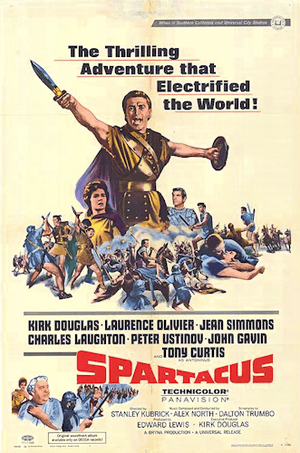
In 1961, Olivier became the director of the new Chichester Festival. He directed and acted in plays there. His production of Uncle Vanya was highly praised.
Leading the National Theatre (1963–1974)
In 1963, Olivier became the first director of Britain's National Theatre. This was a very important role. The company was based at the Old Vic theatre while a new building was being built. Olivier wanted to create a strong acting company. He helped many young actors like Michael Gambon and Maggie Smith become famous.
In his ten years at the National Theatre, Olivier acted in many plays. He also directed eight. His first main role for the National was Othello in 1964. His performance was very powerful. It was also made into a film in 1965. Olivier was nominated for another Oscar for it.
In 1967, Olivier started to face health problems. He was treated for cancer and pneumonia. Despite this, he continued to act. He played Edgar in The Dance of Death. This was one of his best performances outside of Shakespeare.
His last Shakespeare role on stage was Shylock in The Merchant of Venice in 1970. His performance received mixed reviews. In June 1970, he became the first actor to be made a peer. This meant he became Baron Olivier.
In 1972, Olivier starred with Michael Caine in the film Sleuth. Both actors were nominated for Oscars. Olivier also played James Tyrone in Long Day's Journey into Night on stage.
Olivier left his role as director of the National Theatre in 1973. The largest theatre in the new National Theatre building was named the Olivier Theatre in his honour.
Later Years and Legacy (1975–1989)
In his last 15 years, Olivier's health declined. He had several illnesses. He took on many film and TV roles to secure his finances. These roles were often smaller parts. This was because his health made it hard to get insurance for bigger roles.
In 1976, he starred in the film Marathon Man. He played a villain. Critics praised his performance. He was nominated for another Oscar and won a Golden Globe.
Olivier also did a lot of television work. He narrated The World at War, a documentary about World War II. He won Emmy Awards for Long Day's Journey into Night (1973) and Love Among the Ruins (1975). In 1978, he was nominated for his eleventh Oscar for The Boys from Brazil. He also received an honorary Oscar for his lifetime achievements.
In the 1980s, he continued to work in films and TV. He appeared in Brideshead Revisited (1981), winning another Emmy. In 1983, he played his last Shakespearean role as King Lear in a TV show. His final film role was in War Requiem in 1989.
Laurence Olivier died on 11 July 1989, at age 82. He was buried in Poets' Corner in Westminster Abbey.
Honours and Awards
Laurence Olivier received many honours. He was knighted in 1947 for his work in theatre and films. In 1970, he was made a life peer, becoming Baron Olivier. This meant he could sit in the House of Lords. In 1981, he was given the Order of Merit, a very special award. He also received awards from other countries.
He received honorary degrees from universities like Oxford. He won four Academy Awards (Oscars). This included one for Best Actor in Hamlet. He also won two British Academy Film Awards (BAFTAs), five Emmy Awards, and three Golden Globe Awards.
In 1960, Olivier got a star on the Hollywood Walk of Fame. He is also in the American Theater Hall of Fame. The largest theatre at the National Theatre is called the Olivier Theatre. The Laurence Olivier Awards, given every year for theatre, are named after him. In 1991, a memorial stone for him was placed in Poets' Corner at Westminster Abbey. In 2007, a statue of him was unveiled outside the National Theatre.
Acting Style and Impact
Olivier was known for changing his appearance for each role. He often used lots of make-up, wigs, and different voices. He said he couldn't act as himself. He needed to become someone else completely. He would build his performances slowly, paying attention to every small detail.
Olivier was a classically trained actor. He didn't always agree with "method acting," where actors try to deeply feel their character's emotions. He once famously told actor Dustin Hoffman to "just try acting" when Hoffman was struggling with a role.
Olivier, Ralph Richardson, and John Gielgud were known as the "great trinity" of British actors. They were the most important actors on the British stage for many years. Many people thought Olivier was the greatest actor of his time.
After Olivier died, John Gielgud said he was "gifted, brilliant, and one of the great controversial figures of our time in theatre." Olivier was not only a great actor but also a leader in theatre. He helped create Britain's National Theatre, which is seen as one of his most lasting achievements.
|
See also
 In Spanish: Laurence Olivier para niños
In Spanish: Laurence Olivier para niños
- Laurence Olivier Awards
- List of British Academy Award nominees and winners
- List of actors with Academy Award nominations
- List of actors with two or more Academy Award nominations in acting categories
- List of actors with two or more Academy Awards in acting categories


